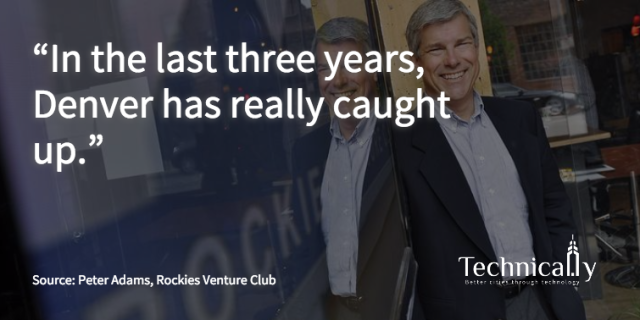While walking downtown, Healthify Software Engineer Shelby Switzer can overhear in-depth conversations about coding languages. In the evening, there are more events than Rockies Venture Club Executive Director Peter Adams knows what to do with.
“Tonight there’s probably six events for startups,” Adams said one recent afternoon.
But it wasn’t always that way.
Denver’s startup roots begin with MapQuest, Photobucket and Rally Software, all three of which still have a presence in the city. They are iconic early web anchors. Comcast’s large office, Qwest and the aerospace and storage industries that grew up around Boulder only bolster the area’s tech talent.
By most accounts, however, the city’s tech community didn’t have the tight-knit feel of Boulder, the far smaller startup town a half-hour to the northwest, which is home to celebrated investor Brad Feld, Techstars and the Boomtown accelerator. Walking on Boulder’s Pearl Street, “you’d run into startup people all the time,” said Bart Lorang, cofounder of FullContact. “In Denver there wasn’t the same vibe. Entrepreneurs didn’t bump into each other.”
When FullContact completed the Techstars accelerator in 2011, the team members decided to help create that environment in Denver. Over the last five years, the startup that makes tools to help manage contacts has in many ways grown up alongside Denver’s startup community.
But Lorang and Adams describe a symbiotic relationship these days. Talent flows between the towns, whether it’s tied to an accelerator or Boulder’s University of Colorado. There’s considerable partnership between the two communities — the respective local Girl Develop It organizers collaborate for example — but now, Denver is (at least) an equal.
“Denver used to be behind a little bit. In the last three years, Denver has really caught up,” Adams said. And with Denver’s growth, startup communities in other Colorado towns like Fort Collins and Colorado Springs are starting to get attention, too.
In Denver, there are also local resources from anchors like the Colorado Technology Association and a wave of coworking spaces to gather. Denver Startup Week is an annual celebration that serves as an entry point and spotlight moment for the community. A growing community of angel investors including both Adams’ Rockies Venture Club and newer firms like v1.vc, which Lorang cofounded, provide seed funding to companies so they can get started without heading for the coasts.
The growth of Denver’s entrepreneurship scene mirrors trends happening in most big U.S. cities today. But it’s done so in a way that fits with an area that looks toward the mountains instead of the Valley. So it’s worth considering: How does a more mature innovation community fit into the larger narrative of how Denver as a whole, and even the country, are developing? That’s the focus the Tomorrow Tour, a multi-city event and reporting series we at Technical.ly are hosting with Comcast NBCUniversal. The Denver stop, an evening of discussion about the future of the Mile High City, is Feb. 3.
Get ticketsAs Denver tells its story, here are four characteristics of the city that stand out, and the specific sectors they connect with:
1. Change Makers: Civic Hacking
Denver is celebrated as a green, progressive place and is bustling with younger residents, many of whom are new and eager to discover Denver. Nearly 16 percent of the city’s residents are between 25 and 34, making it one of the country’s 10 cities with the highest percentage of millennial residents.
Some of that energy has trickled into its tech community, which speaks to the bubbling of its entrepreneurial ecosystem. Millennials want to make a difference, as the generational stereotype goes.
In tech scenes across the country and notably in Denver, one outlet for those passions is civic hacking.
“In general I think a lot of people in Denver and Colorado are just excited about civic hacking and always looking for some way to give back to the community,” said Healthify’s Switzer, a co-organizer of Code for Denver. The two ideas aren’t mutually exclusive.
The group, which was one of the first Code for America brigades, meets weekly, and looks to build partnerships with nonprofits and government. They’ve worked on EnergyStar ratings with the city’s Office of Sustainability, and built an app to help gardeners find a home for excess produce. Switzer said the group has benefitted from reaching out to folks who aren’t necessarily developers, and making meetings more structured. Switzer said there’s also a network in nearby Boulder to tap into, as well as the state’s Go Code Colorado.
2. Healthy Lifestyle: Digital Health
The active lifestyles inspired by nearby natural beauty are immediately associated with health. Within the tech scene, it only figures that there’s a cluster of startups focused on digital health.
Denver is about to get a hub in RiNo in the form of Catalyst, giving the many companies in the city a home. Digital health is also the scene of an innovation in early-stage company infrastructure. Prime Health has been leading the charge for digital health, and recently announced plans to forge connections between entrepreneurs and healthcare organizations around the state through an integrator program.
3. Highly-Educated Workforce: Education
Denver has a reputation for attracting highly-educated transplants, and they’re not done learning when they arrive. The kinds of educational offerings that don’t make the syllabus at four-year institutions are concentrating in Denver.
Galvanize, which offers development and data science courses as well as coworking, began in Denver’s Golden Triangle and has since expanded to other western U.S. tech towns like San Francisco, Seattle and Austin. In February, New York-headquartered computer programming education provider General Assembly is coming to town, and they’ll be located in a new space that New York-headquartered coworking giant WeWork is opening in LoDo. As part of an analysis conducted with Burning Glass, General Assembly identified Denver as having one of the highest concentrations of hybrid IT job openings in the country.
Even VCs are embracing education. A longtime member, Adams embraced educational offerings for investors at Rockies Venture Club when he became executive director. “It was probably 30 days before I realized the angels need education even more than the entrepreneurs,” he said. The Club created a curriculum for angel investors, showing them how to “pull apart a deal,” as Adams put it. Strong mentor networks only reinforce the learning, Adams said. “This community is a real giving community.”
4. Entrepreneurship: Business Services
Richard Lewis of RTL Networks pointed out that Colorado is “a startup state.” You don’t have to go as far back as the pioneer days to find new businesses built in Denver.
When it comes to entrepreneurship, the state’s craft beer boom and budding medical marijuana industry are important signposts. Chipotle and Crocs were founded in Boulder. That string of entrepreneurship naturally extends to tech startups. In Denver, there is a sizable number of startups aiming to make life easier for other businesses. Companies like Lorang’s FullContact, SendGrid, the recently-acquired Rally Software, Brandfolder and Dizzion offer solutions targeted at making life easier for the enterprise.








